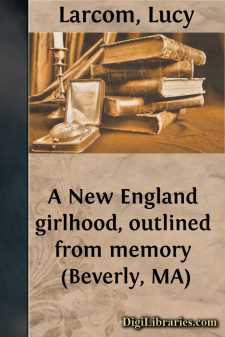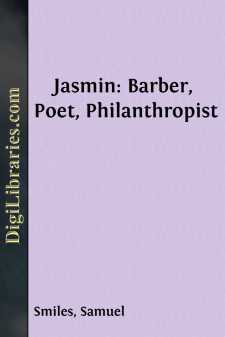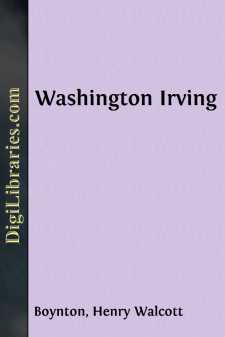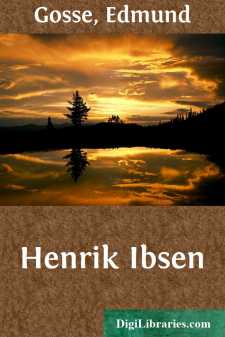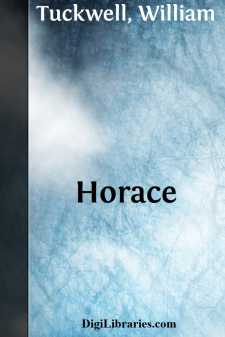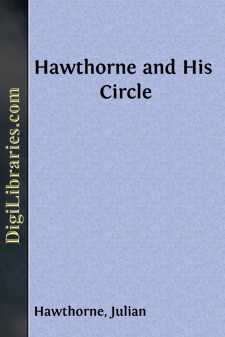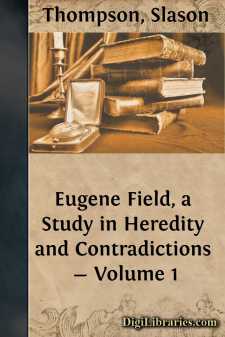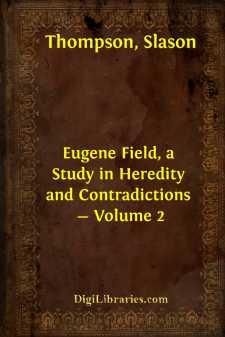Biography & Autobiography
- Adventurers & Explorers 15
- Artists, Architects, Photographers 16
- Business 2
- Composers & Musicians 14
- Criminals & Outlaws 5
- Editors, Journalists, Publishers 6
- Educators 1
- Entertainment & Performing Arts 3
- General 73
- Health, Exercise & Fitness 1
- Historians 3
- Historical 83
- Law Enforcement 1
- Lawyers & Judges 3
- Literary
- Medical 7
- Military 48
- Naturalists, Gardeners, Environmentalists 8
- Personal Memoirs & Diaries 226
- Philosophers 3
- Political 9
- Presidents & Heads of State 38
- Religious 38
- Rich & Famous 27
- Scientists 13
- Women 31
Literary Books
Sort by:
by:
Lucy Larcom
BY THE RIVER. IT did not take us younger ones long to get acquainted with our new home, and to love it. To live beside a river had been to me a child's dream of romance. Rivers, as I pictured them, came down from the mountains, and were born in the clouds. They were bordered by green meadows, and graceful trees leaned over to gaze into their bright mirrors. Our shallow tidal creek was the only...
more...
by:
Samuel Smiles
My attention was first called to the works of the poet Jasmin by the eulogistic articles which appeared in the Revue des Deux Mondes, by De Mazade, Nodier, Villemain, and other well-known reviewers. I afterwards read the articles by Sainte-Beuve, perhaps the finest critic of French literature, on the life and history of Jasmin, in his 'Portraits Contemporains' as well as his admirable article...
more...
EARLY YEARS AND SURROUNDINGS Irving's name stands as the first landmark in American letters. No other American writer has won the same sort of recognition abroad or esteem at home as became his early in life. And he has lost very little ground, so far as we can judge by the appeal to figures. The copyright on his works ran out long since, and a great many editions of Irving, cheap and costly,...
more...
by:
Edmund Gosse
CHAPTER I CHILDHOOD AND YOUTH The parentage of the poet has been traced back to a certain Danish skipper, Peter Ibsen, who, in the beginning of the eighteenth century, made his way over from Stege, the capital of the island of Möen, and became a citizen of Bergen. From that time forth the men of the family, all following the sea in their youth, jovial men of a humorous disposition, continued to haunt...
more...
by:
William Tuckwell
STRUGGLE Quintus Horatius Flaccus, the "old popular Horace" of Tennyson, petted and loved, by Frenchmen and Englishmen especially, above all the poets of antiquity, was born on 8th December, B.C. 65. He calls himself in his poems by the three names indifferently, but to us he is known only by the affectionate diminutive of his second or gentile name, borne by his father, according to the...
more...
by:
Julian Hawthorne
INTRODUCTION Inheritance of friendships—Gracious giants—My own goodfortune—My father the central figure—What did his gift tome cost him?—A revelation in Colorado—Privileges makedifficulties—Lights and shadows of memory—An informalnarrative—Contrast between my father's life and mine. The best use we can make of good fortune is to share it with our fellows. Those to whom good...
more...
by:
William Hazlitt
THE PICTURE H. Oh! is it you? I had something to shew you—I have got a picture here. Do you know any one it's like? S. No, Sir. H. Don't you think it like yourself? S. No: it's much handsomer than I can pretend to be. H. That's because you don't see yourself with the same eyes that others do. I don't think it handsomer, and the expression is hardly so fine as yours...
more...
JOHN FORSTER. A MAN OF LETTERS OF THE OLD SCHOOL. One of the most robust, striking, and many-sided characters of his time was John Forster, a rough, uncompromising personage, who, from small and obscure beginnings, shouldered his way to the front until he came to be looked on by all as guide, friend and arbiter. From a struggling newspaperman he emerged into handsome chambers in Lincoln's Inn...
more...
by:
Slason Thompson
CHAPTER I PEDIGREE "Sir John Maundeville, Kt.," was his prototype, and Father Prout was his patron saint. The one introduced him to the study of British balladry, the other led him to the classic groves of Horace. "I am a Yankee by pedigree and education," wrote Eugene Field to Alice Morse Earle, the author of "The Sabbath in Puritan New England," and other books of the same...
more...
by:
Slason Thompson
CHAPTER I OUR PERSONAL RELATIONS In the loving "Memory" which his brother Roswell contributed to the "Sabine Edition" of Eugene Field's "Little Book of Western Verse," he says: "Comradeship was the indispensable factor in my brother's life. It was strong in his youth: it grew to be an imperative necessity in later life. In the theory that it is sometimes good to be...
more...


